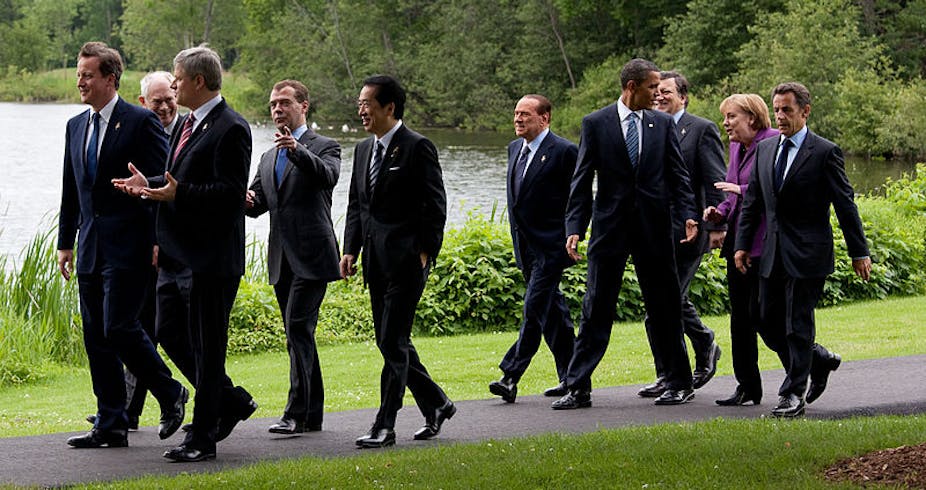Imagine you’d organised a much-anticipated party but because of something you’d said or done nobody turned up? To dismiss the party in the first place would smack of sour grapes but this pretty much captures Sergei Lavrov’s reaction to the Hague Declaration. The leaders of France, the US, the UK, Germany, Japan, Italy and Canada seek to punish Russia over the Ukrainian Crisis by suspending its membership of the G8 and cancelling their attendance at this June’s Sochi Summit.
Instead, the remaining seven intend to hold their own summit in Brussels, no doubt to discuss the black sheep of the family. Lavrov is apparently “not bothered” and now questions the relevance of the G8, stressing instead Russia’s membership of a more relevant group: the G20, many members of which oppose taking a similar line to the G8 of suspending Russia’s membership.
Lavrov’s comments tap into a debate that has been rumbling along for some time but has gained momentum since the Global Financial Crisis. The G8’s response to the crisis was found wanting and instead the G20 with its mix of traditional great powers and rising powers offered a forum with the right people sat round the table. The figures support such a claim – the G8 represents 50% of global economic output but only 12% of population. In contrast, the G20 represents 85% of global economic output and two-thirds of the world’s population. The upgrading of the G20 to a meeting of leaders in November 2008 and its self-appointment the following year as the “premier forum for international economic co-operation” appeared to sound the death knell for the G8.
However, the G8 has not disappeared and continues to meet, suggesting that the leaders have found value in such a forum. It may have lost a leading role in the discussion of international economic co-operation but it continues to be a gathering of the world’s main aid donors. It has also led on a number of issues as disparate as supporting Japan’s recovery from the triple disasters of 2011, or tax avoidance and the role of women in conflict under the UK’s presidency last year.
At the same time, the initial enthusiasm for the G20 has faded for a number of reasons. Its agenda was short-circuited for a time as the eurozone crisis came to dominate successive summits to the exclusion of other issues. As a larger and more diverse forum than the G8, its ability to reach a consensus has also been questioned. Finally, its own legitimacy has come under attack from the overwhelming majority of countries that are not represented at the summit table. Regardless of the above figures, 20 appears to be only marginally more representative than eight.
The result has seen both forums running in parallel and settling into a pattern in the calendar of international summitry whereby the G8 meets in the early summer and the G20 in the late summer/early autumn. With the G8 meeting ahead of the G20, some have suggested that discussions in the former shape those in the latter. Moreover, for some, the G20 is a mechanism by which the rising powers can be socialised into the priorities and norms of the G8.
Join the club
Rather than prioritising a particular forum of global governance or asking what the division of labour between them may be, the more important question concerns Russia’s position in and commitment to the G8 since it officially joined in 1998.
As part of the West’s efforts to manage post-Cold War Russia’s peaceful transition to free-market economics and democratic principles, the original G7 sought to embrace Russia throughout the 1990s. Russia’s chief motivation was to secure the great power status that came with membership of this elite club. Ultimately, Russia’s membership of the G8 was seen as a quid pro quo for Russia’s acceptance of NATO expansion.
One dissenting voice at the time was that of Japan. Partly motivated by its historically poor relationship and ongoing territorial dispute, but also concerned that the founding principles of the G7 would be compromised, Japan resisted Russia’s inclusion. In the absence of formal membership criteria, the Rambouillet Declaration of the G6’s (minus Canada) first summit in November 1975 stressed the leaders’ belief in “open, democratic society, dedicated to individual liberty and social advancement”, providing the ideological glue to bind like-minded leaders together. By ignoring these principles, the G7 sowed the seeds of the forum’s subsequent existential crisis. Japan has reason to gloat.
Russia could have redeemed itself through its actions, but in reality it has contributed little to the G8 over the past 16 years. Its levels of compliance with G8 commitments are low. It is not a significant aid donor. The commitment of its leaders is also far from exemplary. G7 leaders have historically made considerable efforts to attend summits, even when fighting electoral campaigns at home. In 2012, the G8 was originally to be held immediately before the NATO summit in Chicago. As the latter’s agenda included security issues sensitive to Russia, the US hosts sought to assuage Russian sensibilities and changed the G8’s venue at the last minute. Regardless, by staying at home and sending Medvedev in his place, Putin became the only leader to ever snub the G8.
Russia has been in the G8 but not of the G8 and membership is clearly no longer part of Russia’s definition of great power status today. However, this doesn’t mean that the group is irrelevant. Perhaps it is best if Russia is not allowed back into the club. The G7 could then maintain its coherence as a group of like-minded leaders.

